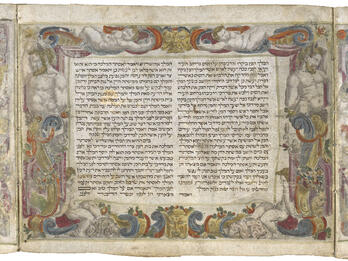Sha‘agat aryeh (The Lion’s Roar)
Chapter 1
What does this man [who contemplates the giving of the Torah] think that Moses our master, may peace be upon him, sat and did for forty days and forty nights when he stayed with the Lord on the mountain without food and drink? Was he putting holes in pearls, or counting the stars? There is no doubt that the Holy One was teaching him the meaning of the entire Torah, and all the details of the laws of the commandments and their minutiae, in order for him to be able to teach them to the children of Israel. Scripture clearly states: And the Lord said unto Moses: “Come up to Me on the mountain and wait there; and I will give thee the tablets of stone with the law and the commandments, which I have written, so that thou may teach them” (Exodus 24:12). Now, the phrase the law and the commandment is that which I have written, and He told him that he would teach them in accordance with that which He would say to him by word of mouth. Thus, [Moses] says: “I make known the statutes of God, and His laws” (Exodus 18:16). If it is so, then there is no way to say that we would have been able to understand the Torah as it is written without any interpretation, since the Lord clarified it for Moses and commanded him to teach it to the children of Israel. What need be said, as He who gave the Torah had a mouth with which He could speak and a hand with which He could write everything clearly, but this is what the Lord decided, in order to give a reward to those who meditate on these matters, and the stability of the times [see Isaiah 33:6] and their studies are focused on them. He said this to our master Moses, may peace be upon him, several times.
When this destructive person sensed that his initial claim was foolish, to suppose that there was a basis for the claim that there could be a Written Torah without an Oral Torah, or that this was the intention of the Lord in His giving of the Torah, he began to say that the received tradition was only passed down from Moses to Joshua, and not beyond. This is because he was forced to admit that our master Moses, may peace be upon him, received the Torah from Sinai, i.e., the Oral Torah, and passed it onto Joshua. Rather, that which we have from the wise men of the generations—and all the way back to Joshua—is not that which our master Moses, may peace be upon him, passed down to him. And they (i.e., the wise men of each and every generation) fabricated commandments and statutes, and they wanted us to believe that they are halakhah given to Moses at Sinai and were received and transmitted from person to person. Thus he spoke in two of his chapters, and in two of my chapters I will give him my honest response.
Chapter 2
When he saw it as impossible to completely deny the fact and claim that the Lord did not give the Oral Torah with the Written Torah to our master Moses, may peace be upon him, he was not ashamed to admit: “There is no concealing the fact that Moses our master, may peace be upon him, interpreted for Joshua some matters that were in need of interpretation, in regard to the commandments of the Torah, etc. However, it is clear from the second chapter of the book of Judges, for after the death of Joshua and his generation, all was immediately forgotten” [see Judges 2:10–12]. He brought evidence of their worship of idols from a book whose parts he found, and from that which was written by Ezra: And they found written . . . that they should dwell in booths, etc. (Nehemiah 8:14). How is this possible when prophecy was never absent from the people of Israel until after the death of Ezra, years after the building of the Second Temple? For in each and every generation, there was a great prophet in charge of upholding the received tradition, apart from other prophets as well. Did not Phineas live a long life, many years after the death of Joshua, even according to the simple meaning of the text? And during his lifetime, there were several judges, until Eli the Priest, and [the tradition continued] from him to Samuel the Prophet [Here he lists several other prophets, leaders, and tannaim], until our holy Rabbi [Judah the Prince], who collected the mishnayot. These are the source of the Gemara, which he [i.e., the destructive person] derides and belittles. Each one of these figures certainly taught the Oral Torah to selected people of his generation; and it was the exact one that Moses taught to Joshua, and Joshua to Phineas, etc. For how can one of them be a prophet to whom the Lord had spoken, but not understand the Torah of the Lord according to its true interpretation as taught by its Giver? This is already mistaken and naïve, since we have shown that it is impossible to understand it without the Oral Torah.
Credits
Published in: The Posen Library of Jewish Culture and Civilization, vol. 5.




